What is your role with Ecoteer? What do you most enjoy about it?
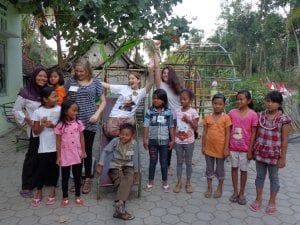
Ashley: I am currently halfway through a year-long internship with Ecoteer, as the Volunteer Cocoordinator at Wildlife Rescue Centre Jogja. As the only native English-speaker onsite my primary role is to liaise with and support the volunteers, both prior to and during their stay, as well as planning and delivering English classes for the staff and the local village children. When I’m not busy with volunteers, I also pitch in and help the animal keepers with their daily duties, which is always a lot of fun!
It’s hard to say what the best part is! Working so closely with endangered species every day is a real privilege and I love it, but the kids club is where I’m in my element. Both Ecoteer and the Centre have given me a lot of creative freedom within the role – I wrote my own syllabus and create all my own materials (almost everything we use is homemade, recycled or donated by volunteers) and this really appeals to my artistic side. Perhaps it’s the diversity that makes the role so special – if I’ve spent a couple of quiet days working on a lesson plan it’s a welcome change to go out and get my hands dirty cleaning cages!
What is your favorite success story of the Wildlife Rescue Centre so far?
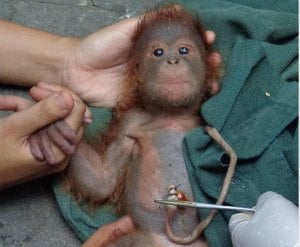
Ashley: The highlight of my stay here has undoubtedly been witnessing the birth of a baby orangutan – probably a once-in-a-lifetime experience! While this was not a ‘planned’ event and is obviously a mixed blessing – it is not ideal for any orangutan to be born in captivity – the determination shown by the center staff to allow the mother to raise her own baby has been inspirational.
Orangutans born in captivity are usually taken from their mothers immediately and raised by humans, making it almost impossible for them to ever survive in the wild. Ucok (the mother orangutan) was orphaned herself and initially showed no maternal instincts, rejecting the baby and refusing to feed her. With enormous pressure to protect this precious new life it would have been easy for the staff to separate them, but with dedication and patience they have ‘taught’ Ucok to feed and clean her baby and now 4 months down the line they are still together and both healthy. The plan is to eventually release them as a family, which would be the perfect happy ending to this success story.
How does the center work with the local community?
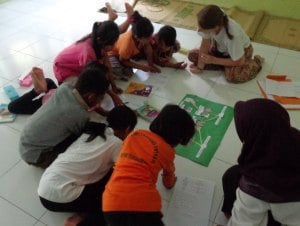
Ashley: The Center is directly adjacent to the neighboring village and much of the land is rented from the villagers. Most of the staff live in the village, so the Center is a source of income and employment for locals, often taking on young people with limited education and training them over a number of years to become experts in their field.
Free English classes are offered to the staff and the local children, an opportunity to not only improve their English but for many, a rare or unique chance to interact with foreigners such as myself and the volunteers. Our volunteer program includes a ‘Javan Dinner’ with the villagers, which is a wonderful cultural exchange for both parties (and the food is always incredible!).
Our English classes are conservation themed and the Center also provides conservation education schemes to the wider community. The thriving illegal pet trade and destruction of natural habitat in this part of the world is fueled by a lack of awareness, so it is a priority to encourage local people to be part of the solution, not part of the problem.
Any tips for volunteers who love animals but have never volunteered with wildlife?
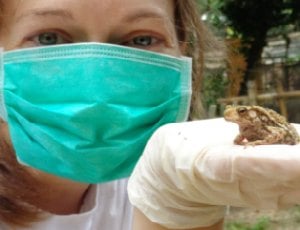
Ashley: Just do it! I’d never worked with wildlife before I came here but it had always been a dream. A good volunteer program (like this one) will fully support people who are inexperienced or a bit nervous and you will have a truly remarkable experience.
I would advise finding out exactly what you’ll be expected to do at a volunteer project. From volunteer feedback I understand that some projects involve cleaning empty cages or similar activities where you never get close to an animal, which might be a bit disappointing. Others may throw you right in at the deep end! WRC Jogja is great because you get up close and personal with a variety of different animals – birds, reptiles, primates – but you are never expected to handle them. The keepers know the animals very well and I have always felt completely safe working with them – they would never put you at risk or make you do something that you weren’t comfortable with. I would also recommend booking for at least two weeks if you possibly can – there is so much to learn and experience that one week just flies by!
What does the program hope to accomplish in the next decade and how do volunteers contribute?
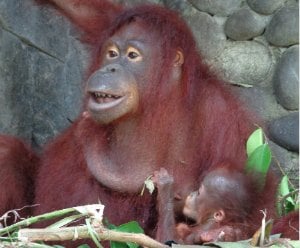
Ashley: The Center receives no government funding and they face a constant struggle to be self-sustaining, so the volunteer program is a vital source of income. After food and accommodation costs, all the money paid by volunteers goes directly into the project, paying for animal food, equipment, staff salaries and other overheads. Many of our volunteers go on to support us further by spreading awareness, recommending the program to others or fundraising for the Center which is terrific.
The Center is constantly receiving new animals and while the goal is to release them whenever this is possible, many animals become long-term or permanent residents as they are not physically or behaviorally capable of surviving in the wild. It is therefore a long-term of the goal for the Center to expand and improve the facilities for animals in their care, including building the world’s first ‘Orangudome’ – a giant facility capable of sustaining up to 200 orangutans in a natural but monitored environment, providing a safe haven and quality of life for orangutans who are unable to return to their rapidly shrinking native habitat.